NASSCOM Animation & Gaming India 2007: Session Wise Coverage
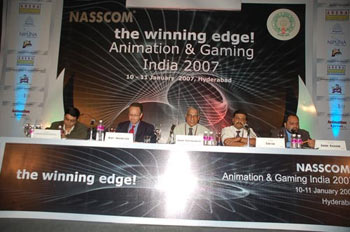
The Indian Animation / Gaming industry has stepped up the gas pedal and is speeding ahead. Even as it zooms ahead there is nagging thought that disturbs…. what about the fuel? The Talented masses that will be needed to take the industry to the next level?
The HRD session held at the NASSCOM Animation & Gaming Summit discussed just that, ‘Strategies and Roadmap for HRD and Training‘
Chaired by The Hindu Consulting Editor Anand Parthasarthy, the panelists included Whistling Woods International Dean Kurt Inderbitzin, Ants MD Chetan S, NID Animation Head Sekhar Mukerjee, Dhruva CEO Rajesh Rao and Anirights CEO Ashish Kulkarni.
The topic of Human Resource Development and Training requires a full day to itself and as such, the 45 minute session was successful in whetting the appetite for more discussion on the subject. And if one found it difficult to cohesively connect and comprehend the various strings of this one discussion, the simple reason was the breadth of the subject is so vast and there are many approaches all seemingly apt that were shared.
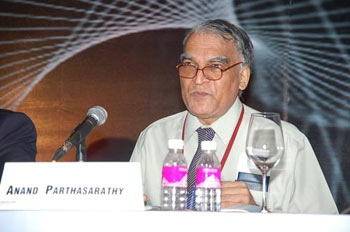
For years now, the industry has always complained that the institutes are churning out software operators and not focusing on the fundamentals. Animation and Gaming studios have argued with a lot of angst that Institutes need to invest some good monies into bringing in experienced experts from overseas who should train their teachers…
That is one side of the coin.
The perspective offered by the institutes is that the Industry needs to come and collaborate, help create curriculums and send in guest faculty.
That has been the status quo for at least three years now.
There have been some new players in the past couple of years that have got in international tie ups as well as the film making aspect into the whole thing. These initiatives are welcome and in the scenario, we are in they are nothing less then a godsend.
But.
Considering the growth targets of the Industry, these initiatives need to upscale and fast and one has to see colleges and institutes tying up with the cream of the crop of the West.
Following are few of the view points offered by the panelists.
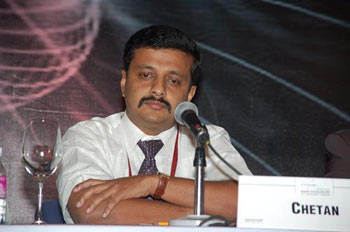
ANTS MD Chetan S began, “Industry keeps complaining about lack of manpower, even we as institutes have a similar problem. Where are the teachers?”
Talking about the short term courses next, Chetan fired another salvo “Since the last three years, students as well as parents that approach us, all of them express their desire to learn as fast as possible. The market demands short term quick fix courses. Now we as an institute realize that ideally we want to only do long term in depth courses that focus on fundamentals. But we need the industry to join hands and to market and position the fact that Animation, like Engineering or Medical Science requires years of learning. This plus the issue of faculty need to be tackled collaboratively”
Ashish S K, emphasized on the long term campus based training programs a need of the hour. He compared the Animation to medical and many other professions to explain why we require the animation professionals to learn for a long period and practice before they jump in to studios for production. It takes studio‘s at least 3 to 6 months of more focused effort before a person can be put on production after been trained in short term animation institute. More over, we are in the business of story telling and film making. Learning tools alone is not enough. The process clarity is not taught at the short programs. Hence it‘s OK for some one to get an entry into the industry but one faces a real challenge once the person gets animation scenes for production.
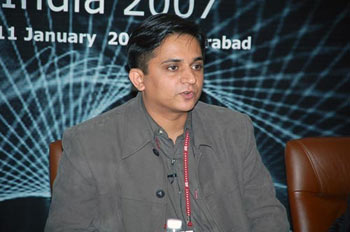
Dhruva‘s Rajesh Rao opined that, “In this field you need more of mentors who are practicing professionals in the Industry. You cannot train some one who has never been in this field to become a faculty. Internally we have some of the best of our guys who take turn to train new recruits”
“But Institutes cannot expect professionals from the industry which is already facing a talent crunch to actually take regular time out of their busy schedules and crazy deadlines to go train their faculty. The institutes have to realize that the extremely critical need is to get the best faculty from overseas if need be and to design their curriculums and training methodologies to be aligned with what is really required by the industry. Yes this would need considerably larger investments, but there is no other way to do it. Today unfortunately the institutes seem to be spending more time and money on advertising their courses and selling dreams.. many young people with no aptitude for animation and games end up taking courses and end up disappointed when they do not get jobs” added a visibly fuming Rao.
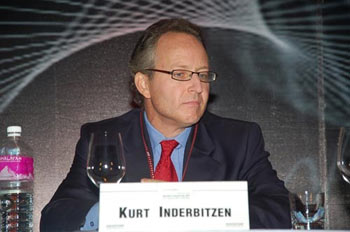
WWIL Dean Kurt Inderbitzin nodding in agreement shared, “We have done exactly that at WWIL. We have the best practicing professionals from every discipline come and teach what they are renowned for. We have Nasserudin Shah who takes acting class, Shiamak Davar for western dance, Ashish heading the animation course. And we have backups so if , for example, Naseer is busy shooting than the class is taken by another expert in the acting craft.”
“We take people who know their fields and then we train them on how to teach. We don‘t have lectures, we have interactive learning, and we have a relentless training schedule for our faculty . All this has built a great faculty for us”
NID‘s Sekhar Mukerjee shared, ” At NID we provide students with enough breathing space and help them discover their own style. Our students are intellectuals; they are thinking film makers, steeped in the richness of art and design. I agree with Chetan, on the issue of teachers, I think the industry has to encourage professionals to take up training there has to be a way out”
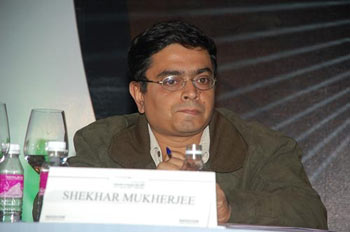
On being asked to talk about the training needs of the gaming industry as compared to that of animation by session chair Parthasarthy, Rao answered, “There is a lot of process driven work in animation, but our‘s is very very urgent need. Students need to have holistic knowledge about game making, context, art styles and a requisite level of talent.
We interviewed a lot of people from animation studios but none of them passed, in games you need to have a lot more depth of knowledge, multi tasking and ability to take decisions etc”
“We have never recruited from institutes that teach people tools. Even when we have it is because the candidate was naturally talented and we know we can train the person. The situation is terrible in my opinion” he added.
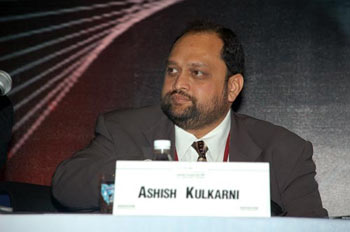
Emphasising yet again on the need for institutes to focus on fundamentals, Anirights Ashish Kulkarni remarked, “90% of people are traditional artists in my studio. We go to smaller villages and pick up students with an artistic background and then train them. It‘s a longer process but the progression is sure shot. However one thing that is necessary is the knowledge of English, because outsourced work comes only in English”
On being asked to opine on wether a model where Institutes also get into production so as to give the students an environment of a production studio, Kulkarni opined, “Production studios should concentrate on production and institutes should focus on training”
Whistling Woods Dean Kurt Inderbitzin shared, “I think the focus has to be on developing original thinkers and writers. The secret lies in making your own content. If you create an environment where your artists can become filmmakers, and create content for you, you have a great chance of motivating and retaining them. And this is how you move away from being in the commodity business of just working for creative minds overseas.”
“Simpsons, South Park have been amongst the simplest animation forms I have seen, but they are cult shows because of the great writing. The focus has to be on teaching writing and creating original, great content. That‘s how you can become leaders in your fields, not mere outsourcing destinations” added Kurt.
Ashish S.K., stated that we need to give due value to the traditional, creative & artistic skills from the school level. We need to start respecting and giving recognition to artistic skills at the early stage, so that students can take a serious look at animation profession just after 12th standard. More over we need to have an input criteria for students.
Session Chair Parthasarthy urged the Government to take note of the situation. “Education in the country is led by the government. There is a lot of unique artistic talent in every region of India and there should be massive training measures initiated by the Government”
As the session, and with it, the entire conference proceedings came to an end, NASSCOM Regional Director and organizer of the summit, Colonel SV Ramachandran emphasized, “I think we need to look at this in a more holistic way in terms of our aspirations. Are we looking 10-15 years down the line when we can rule this space? Fundamentals are the key. We need to have a great number of institutes focused on fundamentals. A model that is attractive is the PPP (Public Private Partnership) model”
Citing the example of ToonzWebel Academy, Kolkata Col. Ramachandran said, ” Many states are willing to get involved in this kind of an initiative. We need to have long term plans and come up with centers of excellence. Initially we will have some shortage of good faculty, but the Industry will have to rope in for that gap of time. Gradually this issue can be resolved. We need to have a big vision and keep in mind that the industry will only move ahead when and if the issue of availability of a large talent pool is met with”